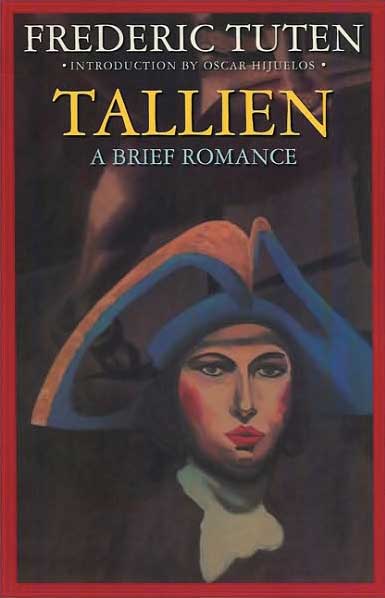
Tallien: A Brief Romance
Purchase Tallien at Amazon or Barnes & Noble
“It was really good, looked like a little nothing, then it went sailing off and sped deep into the heart.” This response by the character Tallien to a brief letter from his former benefactor is likely to be the reader’s to Frederic Tuten’s splendid new novel, his first since the innovative Adventures of Mao on the Long March in 1971. Tallien is a novella in size and seems simple in structure: a middle-aged man visits the deathbed of his father who abandoned him thirty years earlier, a radical activist named Rex. Inspired for years by an idealized version of his father, the disillusioned son now wishes he could tell him the story of the French revolutionary Jean Lambert Tallien (1772-1820), a historical figure whose biography takes up most of Tuten’s novella. An idealist whose erotic obsession with a noblewoman named Thérèse destroys his ideals, Tallien exemplifies a truth the son wishes he could impress upon his father: that a revolution may begin with the best of intentions, but quickly brings out the worst in people.
The stories of Rex and Tallien are linked both in broad outlines and by numerous subtle details (the son wishes for a blanket to keep off the freezing December nights in the Bronx, while Thérèse leaves Tallien for a banker who makes his fortune selling thin blankets to soldiers trying to keep from freezing). The stories also share a colorful vernacular style, maximalist prose within minimalist perimeters. Tuten brilliantly captures the gut-level anxieties of revolutionary activity and the inevitable betrayals—of friends and family, ideals and principles—that attend most attempts to pound the square peg of an ideal into the round hole of reality. The son never tells this cautionary tale to his father but he tells it to us, and for that we should be grateful.
—Steven Moore, Review of Contemporary Fiction, Volume IX 1989
Tuten’s exploration of the theme of man’s obsession with a cause, whether just or unjust, and its consequences, is a worthy and thought-provoking subject.
—Library Journal
[A]n exceptionally erudite and often witty meditation on political and erotic betrayal.
—The New York Times
A delightful novel and a daring somesault between history and fiction.
—Edna O’Brien
In writing a song to his father, Tuten sings to us all…. Tallien is funny, wild, and full of treacheries, like a minefield from some forgotten war. It’s brilliant fiction and a heartbreaking book.
—Jerome Charyn
Swift, funny, impetuous, lovably eloquent, deceptively light, secretly heroic.
—Joseh McElroy
